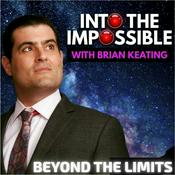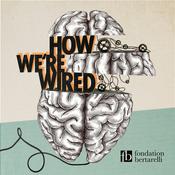66 episodes
- Birds are not merely descendants of dinosaurs — they are dinosaurs. For Yale evolutionary biologist and ornithologist Richard Prum, birds have been a lifelong passion and a window into some of evolution’s most intriguing mysteries.
In a wide-ranging conversation with co-host Janna Levin, Prum traces the deep evolutionary origins of feathers, which he argues first emerged not for flight but for insulation, camouflage and display. Their colors — often invisible to the human eye — come into sharp focus under birds’ ultraviolet vision, suggesting a sensory world far richer than our own.
Prum also explains why he champions Darwin’s once-marginalized theory of sexual selection, which proposes that traits such as the peacock’s tail evolved not for survival, but simply because they were attractive. Beauty, in other words, may shape life as powerfully as utility. - Every time data travels — from smartphones to the cloud, or across the vacuum of space — it relies on a silent but vigilant guardian in the form of error-correcting codes. These codes, baked into nearly every digital system, are designed to detect and repair any errors that noise, interference or cosmic rays might inflict.
In this episode of The Joy of Why, Stanford computer scientist Mary Wootters joins co-host Steven Strogatz to explain how these codes work, and why they matter more than ever. Wootters discusses the evolving list of codes that keep modern communication resilient, and the frontiers in which error correction may have a crucial role, including distributed cloud systems, quantum computing and even DNA-based data storage. - Most cosmologists agree that our universe had a beginning. But the finer details about the Big Bang remain a mystery. A history of everything would explain all, or so theoretical physicists hoped. In his final years, Stephen Hawking working with Thomas Hertog proposed a striking idea: The laws of physics were not precisely determined before the Big Bang; they evolved as the universe evolved.
In this episode of The Joy of Why, Hertog speaks with co-host Janna Levin about his work and partnership with Hawking. Hertog, now at KU Leuven in Belgium, explains why they rejected the popular multiverse theory and instead explored the idea that the universe’s properties are a result of cosmological natural selection. According to Hertog and Hawking, these properties must be viewed through the lens of human observers, who are also the consequence of natural selection.
So, how could the universe have created the conditions needed for life to emerge? Listen to the episode below to find out. - Climate models have changed the way we view the world. While effective, these models are imperfect, and scientists are constantly looking at ways to improve their accuracy and predictability.
MIT professor Elfatih Eltahir has spent decades developing complex models to understand how climate change affects vulnerable regions like the Nile Basin and Singapore. In this episode of The Joy of Why, Eltahir tells co-host Steven Strogatz how growing up near the Nile in Sudan helped him realize that climate change doesn’t occur in isolation. To better understand climate-related impacts and to create more effective adaptation strategies, Eltahir says we need regional models that incorporate contextual data like disease spread and population growth. Eltahir also discusses his “Equation of the Future of Africa,” and he introduces the concept of “outdoor days,” which he hopes can improve public perception about climate change. - Born in the 18th century when Leonhard Euler solved the puzzle of the seven bridges of Königsberg, graph theory has become a foundational tool in mathematics. It studies relationships through nodes (vertices) and the links (edges) that connect them, transforming the complexity of systems — from friendship networks to airline routes — into elegant abstractions that reveal underlying structure and interaction.
Maria Chudnovsky from Princeton University is a leading mathematician in the field. In this episode of The Joy of Why, Chudnovsky talks with co-host Janna Levin about how she got into graph theory, solved the decades-old perfect graph problem, and used it to plan her wedding seating chart. Chudnovsky also reflects on her appearance in commercials as a “superstar mathematician,” and how her background primed her for a discipline that transcends language, culture and time.
More Science podcasts
Trending Science podcasts
About The Joy of Why
“The Joy of Why” is a Quanta Magazine podcast about curiosity and the pursuit of knowledge. The mathematician and author Steven Strogatz and the cosmologist and author Janna Levin take turns interviewing leading researchers about the great scientific and mathematical questions of our time. New episodes are released every other Wednesday.Quanta Magazine is a Pulitzer Prize–winning, editorially independent online publication launched and supported by the Simons Foundation to illuminate big ideas in science and math through public service journalism. Quanta’s reporters and editors focus on developments in mathematics, theoretical physics, theoretical computer science and the basic life sciences, emphasizing timely, accurate, in-depth and well-crafted articles for its broad discerning audience. In 2023, Steven Strogatz received a National Academies Eric and Wendy Schmidt Award for Excellence in Science Communications partly for his work on “The Joy of Why.”
Podcast websiteListen to The Joy of Why, Science Friction and many other podcasts from around the world with the radio.net app

Get the free radio.net app
- Stations and podcasts to bookmark
- Stream via Wi-Fi or Bluetooth
- Supports Carplay & Android Auto
- Many other app features
Get the free radio.net app
- Stations and podcasts to bookmark
- Stream via Wi-Fi or Bluetooth
- Supports Carplay & Android Auto
- Many other app features


The Joy of Why
Scan code,
download the app,
start listening.
download the app,
start listening.





























